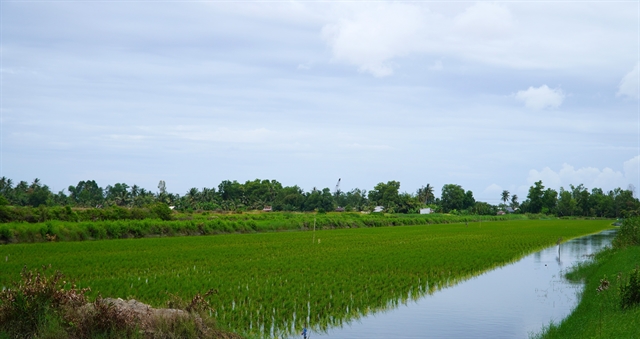 Society
Society

 |
| Rice-shrimp farming fields in An Giang Province. – VNA/VNS Photo Văn Sĩ |
AN GIANG – Farmers in An Giang Province adopting the organic rice-shrimp farming model are earning higher incomes and becoming more resilient to climate change and saltwater intrusion up rivers.
The Cửu Long (Mekong) Delta province has around 107,000ha under the model, mainly in the U Minh Thượng region.
Under this system, farmers alternate between breeding aquatic species, mainly shrimp, in the dry season and growing rice in the rainy season on the same fields to Vietnamese good agricultural practices (VietGAP) and organic standards.
Nguyễn Thanh Điền, who owns a 1ha rice-shrimp field in Đông Hòa Commune, said: “My family applies organic and biosecure methods for both rice and aquaculture, so our output is stable.
“Shrimp, crabs and rice produced under the model fetch higher prices than traditional products, bringing in over VNĐ100 million (US$3,800) per hectare a year and ensuring a steady livelihood.”
The model helps farmers adapt to climate change, improves soil fertility and structure, enhances nutrient absorption, and reduces salt and alum toxicity.
Đông Hòa Commune has some 27,000ha of rice–shrimp farms, including 1,300ha grown to organic standards under contracts with enterprises.
Farmers there achieve yields of six to seven tonnes of rice and two to three tonnes of black tiger shrimp per hectare every year, earning VNĐ100–130 million ($3,800–4,900) per hectare annually, nearly twice the income from traditional farming.
The model’s high-quality products meet domestic and export demand, with many areas certified as organic, helping build the “Đông Hòa rice–shrimp” brand.
Nguyễn Văn Khánh, director of the Thạnh An Shrimp–Crab–Rice Co-operative, said: “Our co-operative has 450ha of rice certified as organic and eligible for export, and 800ha of shrimp certified under the Aquaculture Stewardship Council this year.
“Since partnering with enterprises for organic rice and clean shrimp farming, our members have changed their farming mindset, following strict technical processes that meet export standards. Most importantly, they now feel secure with reliable markets.”
Nguyễn Văn Trường, head of Đông Hòa Commune’s economic bureau, said the province plans to expand the rice-shrimp model in line with the Ministry of Agriculture and Environment’s project on “Sustainable Development of One Million Hectares of High-Quality, Low-Emission Rice Associated with Green Growth in the Mekong Delta by 2030.”
“This will help farmers better adapt to climate change, reduce greenhouse gas emissions, raise incomes, and contribute to green agricultural growth.”
Many farmers in the province have signed farming contracts with enterprises through co-operatives and co-operative groups.
In An Minh Commune, farmer Võ Văn No grows organic ST25 rice on 3.5ha under a sales contract and also farms white-legged and black-tiger shrimps and giant river prawns, harvesting over two tonnes of shrimp and 20 tonnes of rice a year, earning in excess of VNĐ220 million ($8,400) overall.
Joining the Ngã Bát Agricultural Service Co-operative in An Minh Commune had helped him cut costs by 12 per cent and also increase productivity, he said.
“The co-operative guides and trains farmers to apply VietGAP standards for rice and aquaculture, and signs contracts with seed and input suppliers meeting strict quality standards.
“This makes the model more efficient and stable, without relying on middlemen as before.”
An Giang aims to stabilise rice–shrimp farming areas at 117,300ha by 2030, according to its Department of Agriculture and Environment.
Lê Hữu Toàn, the department’s director, said: “To achieve this goal, we are converting low-yield rice fields to rice-shrimp farms and developing the model in regions affected by saltwater intrusion [up rivers].”
The province is promoting technology applications and restructuring production along the value chain from seed and inputs to farming, processing and distribution.
Enterprises play a key role in ensuring stable output, traceability and competitiveness for rice-shrimp products, and An Giang is strengthening co-operatives linked with them, building brands and geographical indications for regional specialities and targeting exports to enhance agricultural value. – VNS




